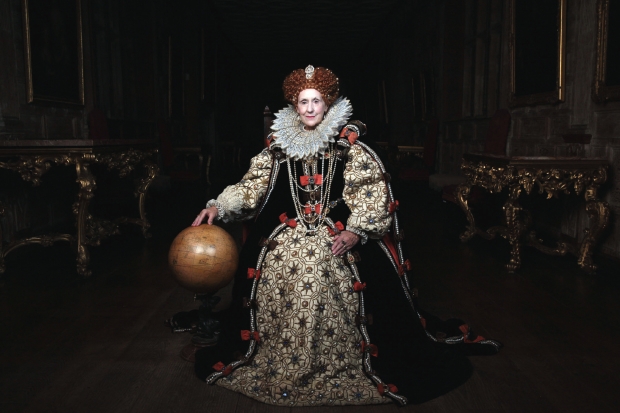It’s hard to know whether the actor James Norton was being naive or disingenuous when he claimed in publicity interviews for BBC1’s Lady Chatterley’s Lover that ‘We are no longer shocked that people have sex.’ Either way, the tabloids soon proved him wrong. Days before the programme went out, the Sun had duly worked itself up into a state of delighted outrage about a TV drama that was apparently ‘so steamy it borders on porn’.
In the event, this proved an exaggeration wild enough to suggest that none of the journalists involved had seen the programme —or, less likely, any porn. Sunday’s adaptation, written and directed by Jed Mercurio, was entirely free of both nudity and any of the rude words famously debated at the 1960 Chatterley trial. (For the record, it did have one ‘cock’.) Even the sex relied regularly on the use of trusty visual imagery, with Mellors shooting guns, wielding large tools and proffering toffee apples for her ladyship to nibble on — when, that is, she wasn’t getting wet in the rain. In the meantime, Mercurio stuck firmly to his avowed policy of treating their affair as ‘a love story, a love triangle’ in which the primary focus would be on ‘the emotions of the characters’.
Not, as it turned out, that all of these emotions were present in D.H. Lawrence’s version. These days we may feel superior to those benighted generations who could accept only the expurgated version of Lady Chatterley’s Lover. Yet Sunday’s programme firmly suggested that the expurgation has now simply moved into other areas. Among the many changes to the original novel, perhaps the biggest was to Sir Clifford Chatterley (the aforementioned James Norton). In the book, Clifford is starkly described as returning from the first world war ‘more or less in bits’, before taking up his role as a symbol of England’s crippled and impotent ruling class. On Sunday, Mercurio made good on his promise to provide ‘a more layered and empathetic portrayal of a once dashing young man’s struggle with disability’.
The decision to make Clifford a fundamentally decent cove did replace Lawrence’s relentless brutality towards him with an often satisfying degree of moral complication. But it also caused continuity problems whenever Clifford had to convey the themes of class by being an unambiguously horrible toff. (‘You have broken the holy order of things as certainly as if she’d lain with an ape,’ he told Mellors after discovering what the man had been up to with his wife. ‘You ought to be wiped off the face of the earth.’)
In Mercurio’s view, a spot of updating was also required for Lady C, on the unimpeachable grounds that her dazed reaction to sex with Mellors ‘didn’t seem to me like a modern portrayal of female sexual behaviour’. (Clearly living in the 1920s is no excuse for not being modern.) The solution here was not just to make her stronger, more in control and so on — but, less predictably, to import several conventions familiar to us from romcom movies.
So it was that, in their early meetings, Mellors and Lady C found each other both intensely annoying and strangely intriguing. They then started to think about one another whenever they were apart, and to exchange increasingly lingering glances whenever they were together. Eventually, much to their own surprise, they found themselves on the floor of his woodland hut, where, unlike in Lawrence, ecstasy was instantly achieved. There was even a romcom happy ending in which the lovers drove off together, having bypassed the many obstacles to their union with admirable efficiency.
And yet, if Sunday’s drama sometimes felt less like an adaptation of the novel than a 21st-century meditation on it, the result was by no means a disaster. In the end, it may still be that the most interesting things about it were the chances it gave us to think again about the novel and to ponder the weird piety of contemporary television. But plenty of the other aspects weren’t bad either.
The injection of added emotion into a book whose characters can sometimes seem to be running a poor second to Lawrence’s wider social concerns was often thoughtfully done — and without those wider concerns completely disappearing. Holliday Grainger captured Lady C’s various dilemmas, Lawrentian or otherwise, with a powerful sense of a woman ambushed by her own feelings. And, although possibly no amount of updating can make Mellors appear wholly believable, Richard Madden did his best to disguise the most absurd aspects, while never abandoning his impressive commitment to looking broody. To his great credit, he also managed to deliver such lines as ‘Open the gates, my lady, so’s John Thomas may come in’ without giggling.






Comments